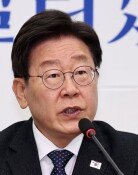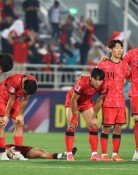[Editorial] Ruling Party Is Reviving Korean Regionalism
[Editorial] Ruling Party Is Reviving Korean Regionalism
Posted October. 23, 2007 07:29,
President Kim Dae-jung raked in 92.3% of Jeolla Provinces votes in the 1997 election. He also earned 400,000 more votes than Grand National Party candidate Lee Hoi-chang in Chungcheong Province due to an alliance with candidate Kim Jong-pil.
In the 2002 election, President Roh Moo-hyun took 92.9% of the vote in Jeolla Province with Kims support, and topped candidate Lee Hoi-chang by 250,000 votes in Chungcheong Province. The advantage in Chungcheong was attributable to the promise of moving the administrative capital to the area. President Roh himself boasted that, I benefited from it.
Political leaders constantly urge the abolishment of regionalism, but when elections near, they end up reaping the benefits of it, as seen in the two previous presidential elections.
The specter of regionalism looms in this election as well. The pan-ruling parties, such as the Unified New Democratic Party (UNDP) and the Democratic Party, are pushing forward to build a western belt of voter support
Democratic Party candidate Rhee In-je mentioned a president from Chuncheong Province and argued for the establishment of a unified western belt front connecting Jeolla, Chungcheong, and the Greater Seoul Metropolitan Area. This implies that he wants the presidential election to be held according to regions, without the slightest consideration of the partys identity or policies.
In past elections, politicians were more subtle in their speeches for fear of criticism, but we can no longer find such subtlety any more. Such impudent straightforwardness is unprecedented. Perhaps the ruling party is hanging on the thread of memories of Kim Dae-jung with such dreadful polls and so little time remaining.
The UNDPs Jeolla and Chungcheong solidarity theory, and the plan to unify candidates with the Democratic Party are all plots to form an anti-GNP regional bloc. The reason why candidate Chung Dong-young tried to entrust Park Ji-won (a proxy of Kim Dae-jung) as election planning advisor was to strengthen the Jeolla representative aspect. It is hard to deny Kims involvement in this plot.
Regionalism paralyzes the rationality of the people, hindering rational political decisions and causing social conflicts. It is retrograde political behavior. The presidential candidates are expected to eradicate deep-rooted regionalism and be at the vanguard of solidarity. Nevertheless, if they should recall the specter of regionalism for the short-term benefit of votes, it signifies that Korean political culture has yet to emerge from its political backwardness. Enlightened citizens should not accept this.







